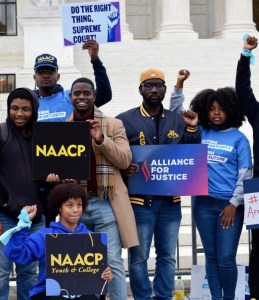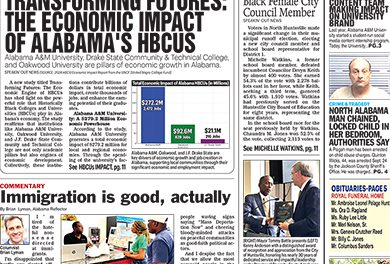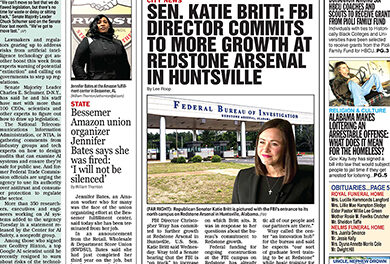The court heard arguments seeking to eliminate consideration of race in college admissions. If the policy is overturned, experts predict a substantial drop in the admissions of African Americans, Hispanics, and Native Americans.
by Maya Pottiger, Word in Black
WASHINGTON, D.C. — Chants of “this is what democracy looks like” filled the air outside of the Supreme Court on Monday. Protestors lifted signs and donned blue shirts that read #DefendDiversity and Affirm Opportunity, Affirm Our Future.
This was the scene ahead of the Supreme Court hearing arguments that aim to reverse affirmative action, or the lawful practice of considering race as a factor in college admissions decisions.
More than 100 protestors were gathered outside the Supreme Court by 9 a.m., more than an hour before the arguments started — some local, others traveling from North Carolina and Massachusetts, to make their voices heard. Most appeared to be in support of affirmative action.
Mayah Emerson, the senior higher education access coordinator at the Lawyers’ Committee for Civil Rights, says she was “saddened but not disheartened” to learn that the Court was hearing new arguments against affirmative action. She traveled to D.C. because her colleague was in the courtroom arguing “on behalf of students and alumni to affirm diversity, to keep affirmative action the rule of law in this country, and to ensure that we have equal access to higher education.”
“We are not tired of these fights,” Emerson says. “We are not surprised by the attacks that we get on equity in education. So, sad that we have to redo this, but in no way deterred, as you can see.”
Two separate arguments were heard, both led by Edward Blum, who is funded by conservative donors and was instrumental in the gutting of the Voting Rights Act of 1965.
Blum has spent decades “scrolling the internet and looking for someone to sue” over race-based laws that try to help repair historic inequities, ranging from education to voting rights. He’s filed Students for Fair Admissions v. University of NC (21-707) and Students for Fair Admissions v. President and Fellows of Harvard (20-1199). Blum is the president of Students for Fair Admissions — SFFA.
In the Harvard case, SFFA argued that Asian American applicants are held to a higher academic standard than other prospective students and are admitted at lower rates than white applicants, even though they have higher test scores. In the UNC case, SFFA said the college discriminates against white applicants.
Help us improve Word In Black
We want to get to know you better. Take our survey (it only takes a couple of minutes) so we can learn your interests. We appreciate your feedback!
During the arguments, justices Sonia Sotomayor and Ketanji Brown Jackson challenged Patrick Strawbridge, the attorney for SFFA, who seemed to be saying that affirmative action meant race could be the only factor in a student’s admission.
“They’re looking at the full person, with all these characteristics,” Jackson said during the argument.
Legacy admissions were also brought into Monday’s arguments. Though Harvard does not release official numbers of legacy admissions, a survey by the Harvard Crimson found that about 15.5% of the class of 2025 are children of alumni, which is up from 12% in the previous freshman class.
Jackson described a scenario where two applicants are asking for their family backgrounds to be taken into consideration. One student would be a fifth generation legacy and wanted to honor his family in that way, where the other student’s family has also lived in the state for generations, but they were slaves and did not have the opportunity to attend higher education, so he wanted to honor his family int hat way.
Justice Ketanji Brown Jackson confronted the lawyer arguing for outlawing affirmative action with how his proposed college admissions system would privilege a white legacy applicant over a Black descendent of slaves. Listen here –> pic.twitter.com/YYUczNakM8— Demand Justice (@WeDemandJustice) October 31, 2022
But without race-conscious admissions rules, these applicants would have “dramatically different” chances to tell their stories, Jackson said. The first applicant’s background would be considered, but the second wouldn’t because it’s “bound up with his race and the race of his ancestors.”
“Why is telling him no not an Equal Protection violation?” Jackson asked.
A decision is not expected until next year, but the Supreme Court is expected to rule in favor of SFFA, delivering a huge blow to the country’s education system.
A Reason for Concern
There is “definitely reason for concern,” says Lee Bollinger, president of Columbia University. Bollinger was president of the University of Michigan in 2003 during the landmark Grutter v. Bollinger Supreme Court decision, which said colleges could consider race in a limited way as a factor for admissions. That case was the first time affirmative action was called a constitutional right.
In addition to several justices indicating “skepticism or opposition to affirmative action in higher education,” Bollinger says, “there’s the recent decision in Dobbs overruling Roe vs. Wade, which indicates a willingness to discard prior precedents, and Grutter is really the landmark decision in this area.”
In 2016, the most recent year the data is available, only 15% of the college population in this country was Black, compared to 53% white. And, in 2019, Black students made up the smallest percentage of high school graduates that were enrolled in college, according to the Bureau of Labor Statistics.
One of Bollinger’s worries is that the fear of overruling Grutter is “mitigated by an assumption that there are easy, other ways to do this, and the answer is there’s not. And we have proof of that. And we shouldn’t take this lightly.”
A misconception is that the 14th Amendment — which says states can’t make or enforce laws that limit the rights of citizens — only applies to state action, or public universities, Bollinger says. But the Equal Protection Clause means that, whatever the Supreme Court decides, anything in the context of public universities will apply to private universities.
“If we say it’s unconstitutional to consider race in higher education, that is a strong, potent message about our values, generally, and will lead to very significant backwards movement on the goal of Brown,” Bollinger says. “We would enter an era in which we would really fall back on the effort to achieve the ideals of Brown in the civil rights movement.”
“The result,” Bollinger says, “is a very substantial fall in the admissions of African Americans, Hispanics, and Native Americans.”
Get Word In Black directly in your inbox. Subscribe today.
Help us Continue to tell OUR Story and join the AFRO family as a member – subscribers are now members! Join here!
The post The Latest Attack on Affirmative Action Heads to the Supreme Court appeared first on AFRO American Newspapers .











